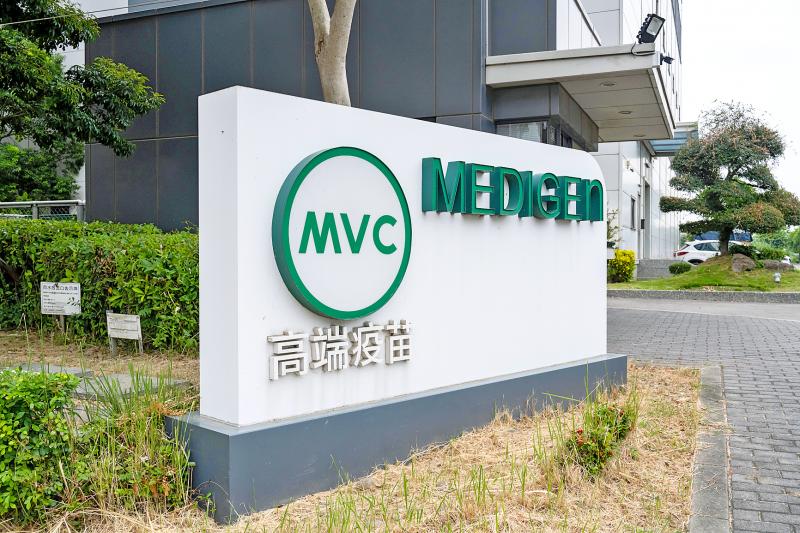Medigen Vaccine Biologics Corp’s (高端疫苗) board of directors yesterday approved a proposal to conduct a phase 3 clinical trial of its COVID-19 vaccine in Europe, it said yesterday.
The final stage of human tests, if approved by the European Medicines Agency (EMA), would mark a big milestone in the COVID-19 vaccine development of Medigen, which has so far completed phase 1 and 2 clinical trials in Taiwan and is conducting a small phase 3 clinical trial in Paraguay.
Medigen in July consulted the EMA about conducting clinicial trials of its vaccine and it received a “positive response” from the agency, the company said in a statement.

Photo: Bloomberg
The EMA advised the company to conduct a phase 3 clinical trial directly in Europe instead of phase 1 or phase 2 trials, as the European regulator took into account that Medigen had completed earlier-stage human tests of the vaccine in Taiwan, company spokesman Leo Lee (李思賢) told by telephone.
The company is to finalize its design for the protocols of the phase 3 clinical trial in the near term and would apply to the EMA for permission to go ahead with it.
Although Medigen had researched how a third shot would bolster immunity by giving tens of participants in Taiwan a third dose, the company would still give two doses to those enrolled in its phase 3 trial in Europe, Lee said.
The number of participants in the clinical trial in Europe is expected to be 4,000 or fewer, and the trial would be conducted in multiple locations in multiple countries in Europe, it said.
“If everything goes smoothly, the clinical trial would begin in November and yield preliminary results in the first quarter next year,” Lee said.
It is possible that Medigen would be able to conduct an immunobridging study to compare the levels of antibodies in people who have received a Medigen vaccine against those who have been given one of the vaccines approved in Europe, the company said.
So far, the EMA has approved four COVID-19 vaccines for use in Europe: Pfizer-BioNTech, Moderna, AstraZeneca and Johnson & Johnson; the first two are developed by the messenger RNA technology while the latter two are adenovirus-based vaccines, the EMA’s Web site showed.
Medigen’s vaccine is a protein-subunit vaccine, developed by the recombinant technology; the vaccine comprises recombinant spike protein of SARS-CoV-2 as the antigen to help a person’s body recognize the real virus if the person becomes infected, company data showed.

Taiwan Semiconductor Manufacturing Co (TSMC, 台積電) last week recorded an increase in the number of shareholders to the highest in almost eight months, despite its share price falling 3.38 percent from the previous week, Taiwan Stock Exchange data released on Saturday showed. As of Friday, TSMC had 1.88 million shareholders, the most since the week of April 25 and an increase of 31,870 from the previous week, the data showed. The number of shareholders jumped despite a drop of NT$50 (US$1.59), or 3.38 percent, in TSMC’s share price from a week earlier to NT$1,430, as investors took profits from their earlier gains

In a high-security Shenzhen laboratory, Chinese scientists have built what Washington has spent years trying to prevent: a prototype of a machine capable of producing the cutting-edge semiconductor chips that power artificial intelligence (AI), smartphones and weapons central to Western military dominance, Reuters has learned. Completed early this year and undergoing testing, the prototype fills nearly an entire factory floor. It was built by a team of former engineers from Dutch semiconductor giant ASML who reverse-engineered the company’s extreme ultraviolet lithography (EUV) machines, according to two people with knowledge of the project. EUV machines sit at the heart of a technological Cold

AI TALENT: No financial details were released about the deal, in which top Groq executives, including its CEO, would join Nvidia to help advance the technology Nvidia Corp has agreed to a licensing deal with artificial intelligence (AI) start-up Groq, furthering its investments in companies connected to the AI boom and gaining the right to add a new type of technology to its products. The world’s largest publicly traded company has paid for the right to use Groq’s technology and is to integrate its chip design into future products. Some of the start-up’s executives are leaving to join Nvidia to help with that effort, the companies said. Groq would continue as an independent company with a new chief executive, it said on Wednesday in a post on its Web

CHINA RIVAL: The chips are positioned to compete with Nvidia’s Hopper and Blackwell products and would enable clusters connecting more than 100,000 chips Moore Threads Technology Co (摩爾線程) introduced a new generation of chips aimed at reducing artificial intelligence (AI) developers’ dependence on Nvidia Corp’s hardware, just weeks after pulling off one of the most successful Chinese initial public offerings (IPOs) in years. “These products will significantly enhance world-class computing speed and capabilities that all developers aspire to,” Moore Threads CEO Zhang Jianzhong (張建中), a former Nvidia executive, said on Saturday at a company event in Beijing. “We hope they can meet the needs of more developers in China so that you no longer need to wait for advanced foreign products.” Chinese chipmakers are in